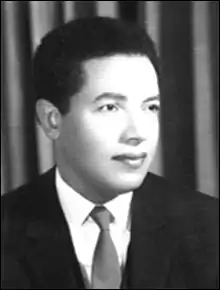Mustafa Mahmoud
Mustafa Kamal Mahmoud Hussein (Arabic: مصطفى كمال محمود حسين; 27 December 1921 – 31 October 2009[1]) commonly known as Mustafa Mahmoud (Arabic: مصطفى محمود) was an Egyptian doctor, philosopher, and author.[2] Mustafa Mahmoud was born in Shibin el-Kom, Monufia province, Egypt. He was trained as a doctor, but later chose a career as a journalist and author, traveling and writing on many subjects.[3]
Mustafa Mahmoud | |
|---|---|
 Mustafa Mahmoud | |
| Born | 25 December 1921 |
| Died | 31 October 2009 (aged 87) |
| Nationality | Egyptian |
| Occupation | Physician, author, Muslim scholar and reformer |
| Known for | Egyptian intellectual |
He wrote 89 books in science, philosophy, religion, politics, and society as well as plays, tales, and travelogues.
He is also known for his popular program (Science and Faith (TV Program)). He is the founder of a mosque, medical clinic as well as a charitable association, all named after him. They are considered to be one of the leading examples of Islamist social services and a redefinition of communal norms in the public sphere in post-Nasserist Egypt.[4][5]

In 1994, the German newspaper Die Zeit compared his celebrities in Egypt as a writer to the German author Heinz G. Konsalik and as a TV presenter to Robert Lembke.[6]
Autobiography
The material in this section is derived from self-published information by the subject.[3]
Early life
Mustafa Mahmoud says that he was raised in a middle-class family. His father was employed as a secretary in the province of El Gharbiyya.
Mustafa Mahmud says he led his early life in a pleasant atmosphere wherein there was no oppression or violence. Rather, he enjoyed freedom and responsibility. In his early age in elementary school, he failed three years consecutively (He was a good student, but after an Arabic language teacher physically abused him, he got frustrated and left the school. But after the teacher reallocated to teach in another school, Mustafa came back to his school to continue studying there), yet he was left without any reproach or blame. In his childhood, he used to lay down ill. Thus, he was deprived of enjoying rough play, and running, which the children used to indulge in. He remained an introvert and spent his early days in imagination and dreams. He dreamed of being a great inventor or a discoverer or a traveler or a famous scientist. His role models were Christopher Columbus, Edison, Marconi and Pasteur.
Medical studies
Mustafa Mahmud chose medicine as a field of study.
In his third year of studies he was admitted into hospital for three years of treatment. He describes this long isolation as a positive contribution to the development of his character, when he could indulge himself totally to reading and thinking of literary works. In these three years, the meditative character was fashioned within himself, and thus the writer was born.
After his recovery, he resumed his medical studies and says that he subsequently realized an immense change within himself. He discovered within himself the artist who reflects, reads, and peruses regularly the major sources of literature, plays, and novels. Owing to this new activity, (which in no time he became an expert at), he began to write regularly to the newspapers, (in his final year of medicine). Accordingly, he had to intensify his effort to graduate and attain success. He started writing for El Tahrir and Rose El Yusef magazines. Due to his illness he graduated two or three years after his colleagues, in 1953.
His journeys
Mustafa Mahmud describes his frequent travels, starting with his journeys to the Tropics in Tanzania, Uganda, Kenya, and the south of Sudan, where he stayed for two months with the tribe of Niam Niam. Thereafter, he traveled to the Sahara Desert, to the oasis of Ghadamis, where he stayed for a month with the tribe of El Tawariq. Furthermore, he traveled to many capitals of European and American countries, such as: Italy, Germany, Greece, France, Canada and the United States; and to the Arab countries, beginning with Morocco and Algeria in the west; and ending with Lebanon, Syria and Saudi Arabia in the east.
There was another journey, one within himself; he boarded the ship of science, knowledge, and religion (starting from the Indian Fideism, Zoroaster, Buddha; and ending with Moses, Jesus, and Muhammad. Finally he found his comfort and himself in the Qur'an. Thus he concluded his traveling, and devoted himself totally to reflection and contemplation. He lived among the jurists, scholars, and Sufis, and found that the Qur'an is an ocean around which all the branches of knowledge gather together.
He wrote five books criticizing the Marxist thought: Islamic left Fib; Marxism and Islam; Leftism Collapse; Why Did I Refuse Marxism?; and The Antichrist. He was persuaded that Marxism was one of the pickaxes which destroyed the current civilization; at worst, it was an instrument that caused the creation of a spiteful, negative and rejecting character. He has seventy-five books published, six of them were adapted for stage: (Earthquake; Man and Shade; The Great Alexander; The Social Gang (Shilla-t 'Uns); Blood Odor; The Devil Lives in our House), one of them (The Impossible) was presented as a film; twenty-five books deal with Islamic subjects; and the rest consists of studies and short stories. TV presented for him more than four hundred episodes of the program "Science and Faith", in which the movie, scientific substance and Sufi meditation guide us to the faith in God.
In the year 1960 he left his medical career, devoting himself totally to writing for newspapers. As a physician, moving from one hospital to another (particularly, among the Hospitals of Chest Diseases in Abbasiyya, Chest diseases in 'Almazha, Chest diseases in Dumyat, and the dispensary of Umm el-Masriyyeen), between the years 1953 and 1960, all had a great influence on his writings, principally: Storehouse No. 7 (`Anbar 7), the Social Gang (Shilla-t 'Uns), and Eating Bread (Akl-`Aysh). In the meantime, it had an influence on his scientific and anatomical access to the public adversities, to the human soul and to the characters he dealt with in all his writings.
Another character who had a profound effect on him was his father, whose long-time illness, patience, faith, and pure innate nature remained in his mind throughout his life. As he grew older and encountered life's affairs in his thirties, a woman played a great role in and had an effectual control on his life, as a friend, a dialogist, and a lover. His faults were always due to losing control of himself when he looked at any beautiful things. Above all, he believed that no man is a perfect one unless he has found a woman to love, to marry, to have children with, and to feel parenthood and establish a family.
Marriage
Mustafa Mahmud says that his first marriage in 1961 was not successful, though from it, he was endowed with a girl and a boy, Amal and Adham. The marriage ended in 1973. His second marriage in 1983 was also unsuccessful and ended in 1987. The reason behind these divorces was the passion of writing that controlled his life, his preoccupation with his work and finally his isolation. Yet both of them were to be blamed.
Bibliography
Books
- (2004): Understanding The Qur'an : A Contemporary Approach ISBN 1-59008-022-X
- (1999): What's Behind The Gate of Death
- (1998): The Password ISBN 977-08-0694-3
- (1998): New Quranic Psychology ISBN 978-977-11-1718-6
- (1997): Israel: The Beginning and The End
- (1995): The Burning Tomorrow
- (1994): Islam in the Dike
- (1992): I Saw God
- (1992): Political Islam and the Upcoming Battle ISBN 977-08-0403-7
- (1991): Political Circus Games
- (1990): Reading for the future ISBN 977-08-0037-6
- (1989): The Perplexed Question ISBN 977-02-2611-4
- (1985): Bahai Facts ISBN 977-02-1502-3
- (1984): Marxism and Islam ISBN 977-02-0969-4
- (1984): Gentlemen, Unveil These Masks! ISBN 977-02-0901-5
- (1984): What is Islam? ISBN 977-02-1110-9
- (1982): From America to the other Shore ISBN 977-02-0255-X
- (1981): Dialog Antara Muslim Dan Atheis ISBN 9971-77-021-0
- (1978): The Quran: A Living Creature
- (1978): Age of Monkeys
- (1978): The Lie About the Left Islamist Groups ISBN 977-247-404-2
- (1976): Existence and Nonentity
- (1975): Muhammad
- (1975): The Greatest Secret
- (1974): Dialogue with an Atheist
- (1972): Allah
- (1972): The Torah
- (1970): My journey from Doubt to Belief
- (1969): The Quran - An Attempt to a Modern Understanding
- (1961): Einstein and Relativity
- (1959): Death mystery ISBN 978-977-11-1724-7
Articles
- (1992): The World of Secrets
- (1985): The Devil Rules
- (1982): Is It The Age of Insanity? ISBN 977-02-0499-4
- (1979): Fire under the ashes
- (1973): The Spirit & The Body
- (1966): In Love and Life
Short Stories
- (1979): The Antichrist
- (1966): The Smell of Blood
- (1964): The Social Gang
- (1954): Eating Bread
Novels
- (1966): A Man Less Than Zero
- (1965): Getting out of the Coffin
- (1965): The Spider
- (1964): Opium
- (1960): The Impossible
Plays
- (1996): A Visit to Heaven and Hell
- (1982): The Smallest Hell-fire
- (1973): The Leader
- (1973): The Devil Lives in our House
- (1964): The Human and the Shadow
- (1963): The Earthquake
- (1963): Alexander The Great
| N° | Book Title | Publication |
|---|---|---|
| 1 | Alexander The Great | 1963 |
| 2 | The Earthquake | 1963 |
| 3 | The Human and the Shadow | 1964 |
| 4 | The Devil Lives in our House | 1973 |
| 5 | The Leader | 1973 |
| 6 | The Smallest Hell-fire | 1982 |
| 7 | A Visit to Hell and Heaven | 1996 |
Travel Literature
- (1971): The Road to the Kaaba
- (1971): Traveler Stories
- (1969): Adventure in the Desert
- (1963): The Forest
Memorials, honors and awards
- 1995 Literature State Appreciation Award (Egypt)
- Mustafa Mahmud Square, Cairo, Egypt
- Asteroid 296753 Mustafamahmoud, discovered by Russian amateur astronomer Timur Kryachko at the Zelenchukskaya Station in 2009, was named in his memory.[2] The official naming citation was published by the Minor Planet Center on 12 July 2014 (M.P.C. 89086).[7]
References
- "وفاة المفكر المصري مصطفى محمود" (in Arabic). Retrieved 2017-10-10.
- "296753 Mustafamahmoud (2009 UP14)". Minor Planet Center. Retrieved 13 September 2019.
- "The Founder...A Biography" (in Arabic). Mustafa Mahmud. Retrieved 2009-03-05.
- "The Mukhabarat and Mahmoud: who mattered more to Egypt in the long run?". Foreign Policy. Retrieved 2017-10-10.
- Salvatore, Armando (2001). Muslim Traditions and Modern Techniques of Power. LIT Verlag Münster. ISBN 9783825848019.
- "Biedermann mit zündelnden Freunden: Mustafa Mahmud: Kairos Konsalik". Die Zeit (in German). 1994-09-23. ISSN 0044-2070. Retrieved 2017-10-10.
- "MPC/MPO/MPS Archive". Minor Planet Center. Retrieved 13 September 2019.